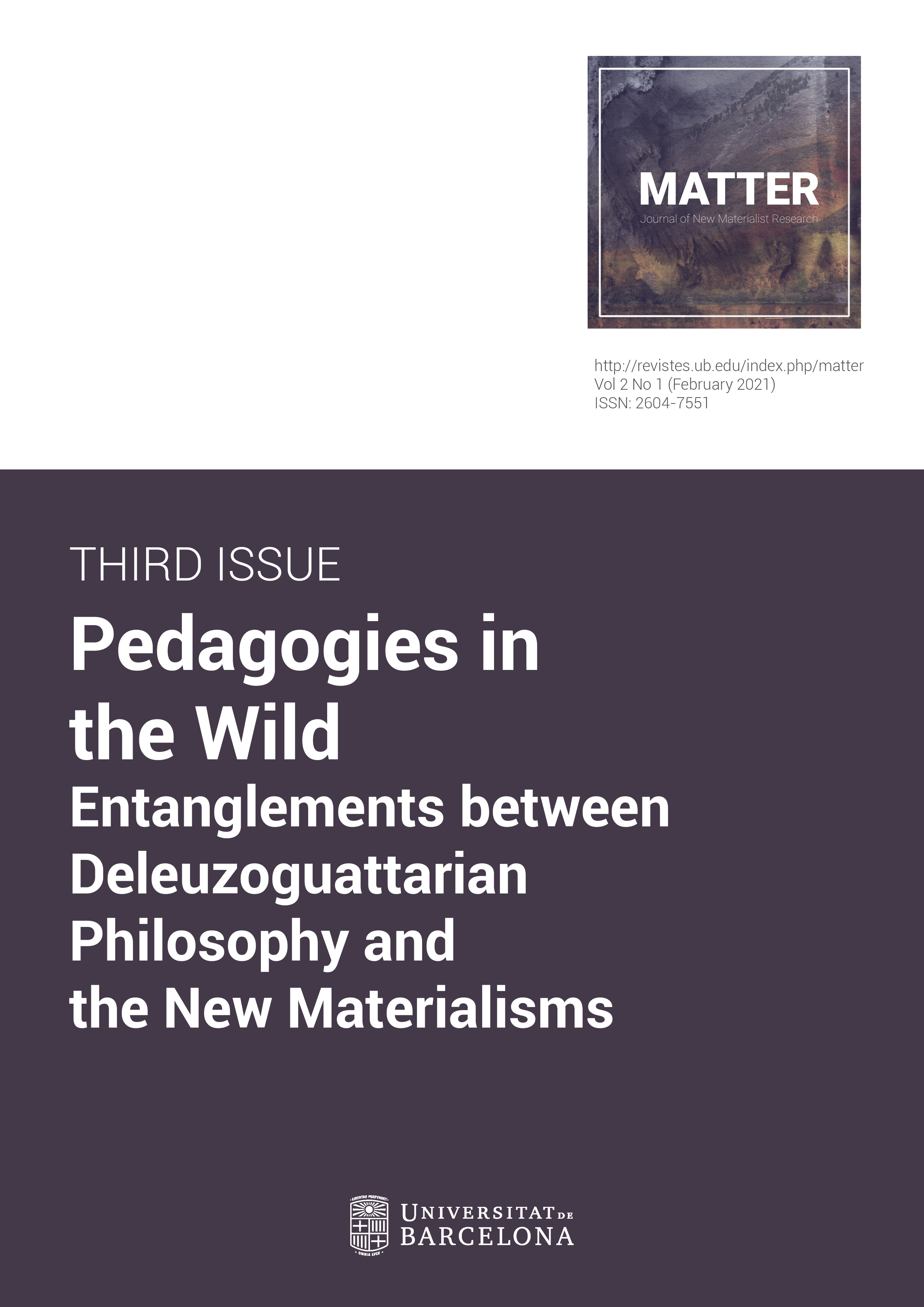Wayward academia—Wild, Connected, and Solitary Diffractions in Everyday Praxis
DOI:
https://doi.org/10.1344/jnmr.v2i1.33371Resum
In this article, I study the everyday conduct of pedagogies in the wild in contemporary academia by means of an analysis of modes of attention in random “thicker ‘moments’of spacetimemattering” (Barad, 2014, p. 169). These modes are discussed with the help of the notion of diffraction. I identify three modes of attention—the solitary, the connected, and the wild—that manifest themselves mainly as tensions between several modes. The study leads me to suggest that critical feminist scholarship explicitly aiming to disrupt and trouble normative academia often reproduces competitive, nervous practices, linear onto-epistemologies, and the commodification of both scholars and scholarship. These scholarly practices occur among students and supervisors alike, often in the name of necessity and even survival. Yet, despite the anxiety-inducing aspects of contemporary academia, diffractive moments have a powerful presence, too. In such moments, a wild and responsible otherwise is imagined and diffracted.
Descàrregues
Referències
Ahmed, Sara (2014). Wilful subjects. Duke University Press.
Ahmed, Sara (2017). Living a feminist life. Duke University Press.
Aldrin Salskov, Salla (2020). A critique of our own? On intersectionality and ‘epistemic habits:’ A study of racialization and homonationalism in the Nordic context. NORA, 28(3), 251-265. https://doi.org/10.1080/08038740.2020.1789218.
Barad, Karen (2003). Posthumanist performativity. Toward an understanding of how matter comes to matter. Signs, 28(3), 801-831. https://doi.org/10.1086/345321.
Barad, Karen (2007). Meeting the universe halfway: Quantum physics and the entanglement of matter and meaning. Duke University Press.
Barad, Karen (2014). Diffracting diffraction: Cutting together-apart. Parallax, 20(3), 168-187. https://doi.org/10.1080/13534645.2014.927623.
Berlant, Lauren (2011). Cruel optimism. Duke University Press.
Cielemęcka, Olga, Rogowska-Stangret, Monika, Bhambra, Gurminder K., Pető, Andrea, Loyer, Jessie, Ivancheva, Mariya, Halldórsdóttir & Hlín, Nanna (2019). Praxiography*: Practices and institutions. Roundtable discussion: Thinking together from within the times that worry us. Matter: Journal of New Materialist Research, 1(1), pp. 80-108. https://doi.org/10.1344/jnmr.v1i1.29204.
Deleuze, Gilles, & Parnet, Claire (2007). Dialogues.(H. Thomlinson & B. Habberjack, Trans.). Columbia University Press. Originally published in French in 1977.
Deleuze, Gilles, & Guattari, Félix (1987). A thousand plateaus: Capitalism and schizophrenia. (B. Massumi, Trans.). University of Minnesota Press. Originally published in French in 1980.
Ettorre, Elisabeth (2017). Autoethnography as feminist method: Sensitising the feminist ‘I.’Routledge.
Geerts, Evelien (2016, August 14). Ethico-onto-epistem-ology. New Materialism Almanac. https://newmaterialism.eu/almanac/e/ethico-onto-epistem-ology.html.
Geerts, Evelien, & Carstens, Delphi (2019). Ethico-onto-epistemology. Philosophy Today, 63(4), 915-925. https://doi.org/10.5840/philtoday202019301.
Halberstam, Jack (2019, February 25). Strategy of wildness. Critique & Praxis, 13(13). http://blogs.law.columbia.edu/praxis1313/jack-halberstam-strategy-of-wildness/.
Haraway, Donna J. (1988). Situated knowledges: The science question in feminism and the privilege of partial perspective. Feminist Studies, 14(3), 575-599. https://doi.org/10.2307/3178066.
Haraway, Donna J. (1997). Modest_witness@second_millennium: FemaleMan_meets_OncoMouse. Routledge.
Haraway, Donna J. (2004). The Promises of monsters: A regenerative politics for inappropriate/d others. The Haraway Reader(pp. 63-124). Routledge. Originally published in 1992.
Haraway, Donna J. (2016). Staying with the trouble: Making kin in the Chthulucene. Duke University Press.
Harding, Sandra (1986). The science question in feminism. Cornell University Press.
Hartman, Saidiya V. (2019). Wayward lives, beautiful experiments: Intimate histories of social upheaval. W. W. Norton & Company.
Holmwood, John (2016). The university, democracy and the public sphere. The British journal of the sociology of education, 38(7), 927-942. https://doi.org/10.1080/01425692.2016.1220286.
Juelskjær, Malou (2020). Mattering pedagogy in precarious times of (un)learning. Matter: Journal of New Materialist Research, 1(1), 52-79. https://doi.org/10.1344/jnmr.v1i1.30067.
Lapiņa, Linda (2018). Recruited into Danishness? Affective autoethnography of passing as Danish. European Journal of Women’s Studies, 25(1), 56-70. https://doi.org/10.1177/1350506817722175.
Love, Heather & Peltonen, Salla (2017) Assessing critique, scholarly ‘habits’, queer method and ‘turns’: An interview with Heather Love. Feminist Encounters: A Journal of Critical Studies in Culture and Politics, 1(1), 1-5. https://doi.org/10.20897/femenc.201710.
Marcus, George E., & Saka, Erkan (2006). Assemblage. Theory, culture & society, 23(2-3), pp. 101-106. https://doi.org/10.1177/0263276406062573.
Maury, Olivia (2020). Punctuated temporalities: Temporal borders in student-migrants’ everyday lives. Current Sociology. https://doi.org/10.1177/0011392120936315.
Oinas, Elina (2018). Unlearning a commitment to a ‘we’ in a transnational feminist classroom. In Tamara Shefer, Kopano Ratele, Jeff Hearn & Floretta Boonzaier (Eds.), Engaging youth in activist research and pedagogical praxis: Transnational perspectives on gender, sex and race(pp. 110-125). Routledge.
Ong, Aihwa & Collier, Stephen J. (2008). Global assemblages: Technology, politics, and ethics as anthropological problems. Blackwell Publishing.
Rogowska-Stangret, Monika & Cielemęcka, Olga (2020). Vulnerable academic performances: Dialogues on matters of voice and silence in academia. Matter: Journal of New Materialist Research, 1(1) pp. 23-51. https://doi.org/10.1344/jnmr.v1i1.30161.
Snaza, Nathan (2019). Animate literacies. Duke University Press.
Sobuwa, Simpiwe & McKenna, Sioux (2019). The obstinate notion that higher education is a meritocracy. CriSTaL, 7(2), 1-15. https://doi.org/10.14426/cristal.v7i2.184.
Springgay, Stephanie, & Truman, Sarah E. (2018). On the need for methods beyond proceduralism: Speculative middles, (in)tensions, and response-ability in research. Qualitative Inquiry, 24(3), 203-214. https://doi.org/10.1177/1077800417704464.
St. Pierre, Elizabeth A. (2021). Post qualitative inquiry, the refusal of method, and the risk of the new. Qualitative Inquiry, 27(1), 3-9. https://doi.org/10.1177/1077800419863005.
van der Tuin, Iris, & Nocek, Adam J. (2019). New concepts for materialism: introduction. Philosophy Today,63(4), 815-822. https://doi.org/10.5840/philtoday2019634294.
Vuorela, Ulla (2009). Colonial complicity: The ‘postcolonial’ in a Nordic context. In Suvi Keskinen, Salla Tuori, Sari Irni & Diana Mulinari (Eds.),Complying with colonialism: Gender, race and ethnicity in the Nordic region(pp.19-34). Routledge.
Widerberg, Karin (1995). Kunskapens kön. Norstedts.
Wiegman, Robyn (2016). No guarantee: Feminism’s academic affect and political fantasy. Atlantis: Critical Studies in Gender, Culture & Social Justice,37(2), 83-95. https://journals.msvu.ca/index.php/atlantis/article/view/83-95%20PDF.
Winberg, Chris & Makua, Manyane (2019), ‘We teach them to be university students:’ The role of peer educators in the provision of ontological access to higher education. CriSTaL, 7(1). https://doi.org/10.14426/cristal.v7iSI.18.
Woolf, Virginia (1929). A room of one’s own. Hogarth.
Descàrregues
Publicades
Número
Secció
Llicència
The authors who publish in this journal agree to the following terms:- Authors retain copyright and grant the journal the right of first publication.
- Texts will be published under a Creative Commons Attribution License that allows others to share the work, provided they include an acknowledgement of the work’s authorship, its initial publication in this journal and the terms of the license.






